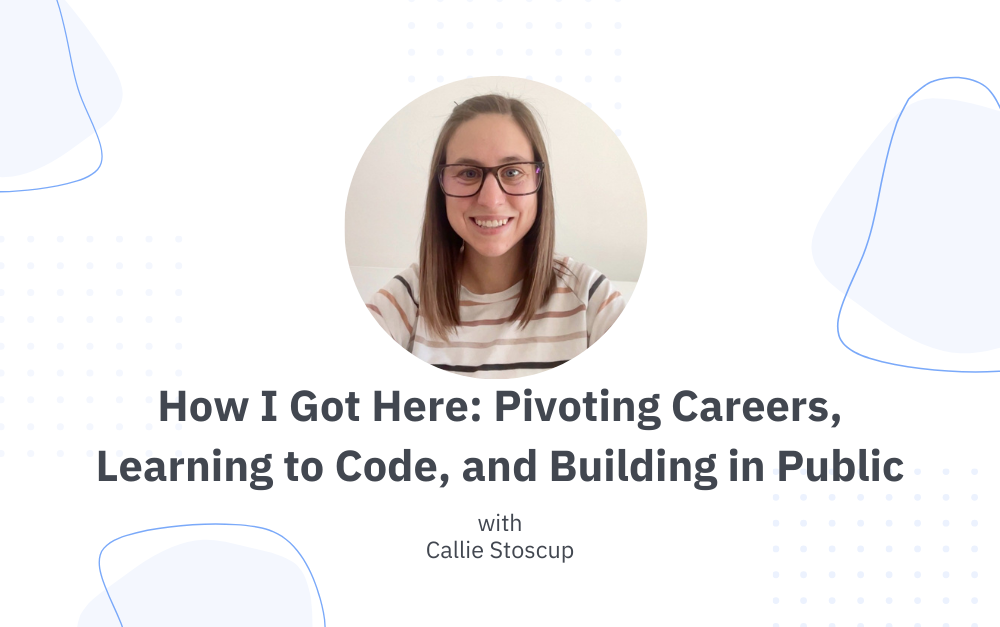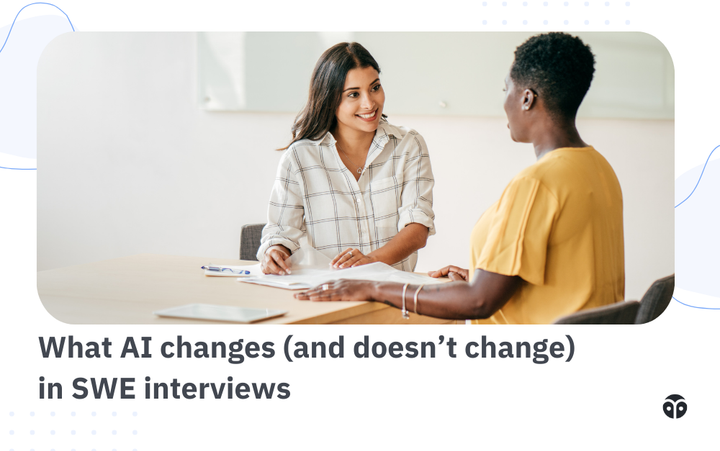How I Got Here: Coding with Callie on Pivoting Careers, Learning to Code, and Building in Public
Callie Stoscup shares her journey from teacher, to stay at home mom, to software engineer, plus advice for others who want to pivot careers.

Can you tell us a little bit about yourself and what you do for fun?
My name is Callie Stoscup. I'm currently a site reliability engineer at HashiCorp. Before that, I was a full-stack developer. It’s been interesting to learn how to go from building applications to supporting others who are building applications.
For fun, I code! I run a coding community for entry-level developers called Coding with Callie, where we meet every Thursday with guest speakers from the software industry.
I love that what you do for fun is what you do for work. That’s the dream, right?
Yes, and it’s great that they support each other. For example, I’ve been a JavaScript developer, but at my new job, they use Go. I’ve never used a strongly typed language before, so I’m learning about it. What’s cool about having coding as a hobby is that I can continue learning in a less-pressure environment outside of work. Last night, I did a really simple API with Go. I followed a tutorial and had fun doing it. I can continue learning outside of work where there’s no pressure, and it’s just fun. I can build what I want and if it breaks, no big deal.
How did your coding community, Coding with Callie, get started?
It started when my boss noticed I was coding a lot outside work hours and warned me about potential burnout. I tried doing something else, but I really missed coding at night. I decided I’d code for myself. I wouldn’t open my work computer, but I’d be free to code and learn what I wanted.
I was a teacher in my former life, and I remember going through bootcamp thinking about all the ways I’d teach differently. When I started my job, I filed away the things I encountered that my bootcamp didn’t teach me or made notes of resources that were missing for different things. I decided I wanted to build an application that helps bridge the gap between coding bootcamps or CS degrees and the expectations in a first job.
How did you transition into software development?
I started coding when I was a stay-at-home mom because I was bored. My daughter is a very independent player and I had extra time that I was wasting on social media.
My husband had a friend who was a developer, and he suggested trying coding. I was a geometry teacher before staying home with my daughter and enjoyed logic-based problems. I quickly became obsessed with coding and decided to go through a coding bootcamp.
How did you choose which coding bootcamp to attend?
I made a spreadsheet. I looked at the advertised salaries for each of the bootcamp graduates, and then I looked at their open availability—when I could get into the next cohort.
I charted out the likely timing combined with possible pay for each option and determined which one would come out ahead in terms of making more money. It was a mathematical decision.
What was your first job after the coding bootcamp, and how did you land it?
I applied for jobs from the start of the bootcamp. When I started learning to code, I had deleted social media apps from my phone and replaced that time with coding. In my bootcamp, I was coding for 12 hours per day, so my “break” from coding turned into mass applying for dev jobs.
I ended up with three job offers before graduating, but I don’t think they were from mass applying. That’s never worked for me. I primarily networked through LinkedIn—I’d post for coffee chats and got to meet a lot of people already working in the industry. I also started posting on LinkedIn every day, talking about what I was learning, and I started getting a lot of traction from those posts. By the end, I had two different companies reach out to interview me, and they turned into offers.
What’s something you learned through this application process that would be helpful for others to know?
I had a mentor meet with me three or four times to help me practice interviewing. Early on, I kept getting booted out of the process after the initial phone screen. I haven’t been booted out of the interview process since meeting with him.
My mistake was focusing too much on how excited I was for the company to teach me. I wasn’t focused on the value I would bring to the company. Even though it’s the same me, and I still have the same excitement of learning, I was able to shift how I was talking about it.
Originally, they would ask, “Have you ever worked with XYZ technology?” and I said, “No, but I’m excited to learn that, and I can’t wait to have that mentorship.” Well, that’s just telling them that they’re going to have to put a lot of work into me to get me up to speed. He taught me to flip it. I’d read the job description and look up anything I didn’t know so that I could draw a comparison to what I did know. I’d say, “I don’t have experience with Laravel, but I know how to set up a server with Express and setting up routes work similarly, so I would be very quick to get up to speed.”
What advice do you have for career pivoters, specifically in their job search?
Be intentional about highlighting transferable skills in a specific way. For example, my experience running a woodworking business taught me about product development, customer interaction, and project management—skills valuable in software development. Craft a cover letter and personal narrative that shows those strengths. Even if you’re a career pivoter, there’s a huge difference between hiring someone with ten years of work experience versus hiring someone young and right out of school. It’s not your first job. Showcase that while trying together similarities.
Also, learn and build in public. It can be incredibly beneficial. I know it’s hard to put yourself out there, but it’s such a valuable thing to do.
Is it harder to get a job as a career pivoter in the current job market?
It’s a tough market, but you have to see what works for you. If standard job applications aren’t working, you might need to change your strategy and get outside of your comfort zone to find something that will work. Consider every rejection or failure as a data point to learn from.
My job at HashiCorp was a result of networking and building my profile in public. In this market, cold applications are tough—they rarely work. Figure out how you can stand out and make connections. And keep learning the whole time.



